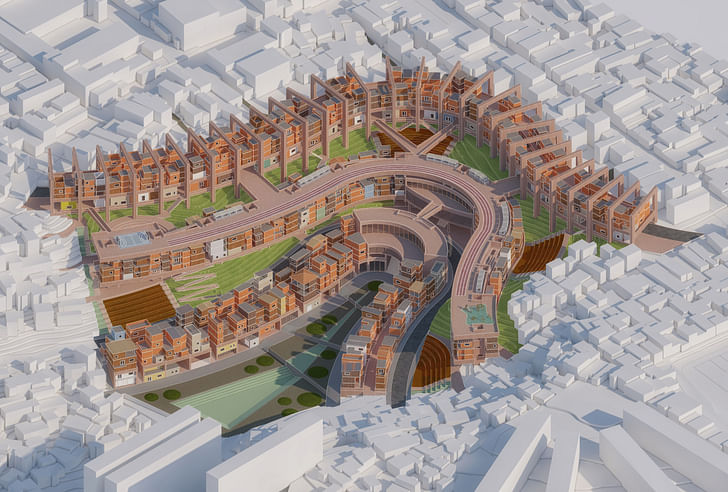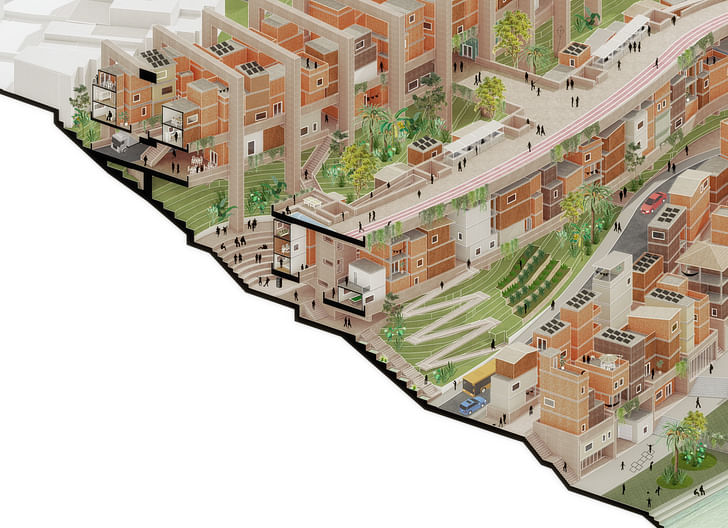

Graduate student Lucas Pissetti poses the question, how does one "improve basic life conditions for the people in need, while preserving the qualities that are very specific to their location?"
A recent graduate from the Academy of Architecture Amsterdam, Pissetti investigates favelas in Brazil and discusses his design strategy to improve the relationship residents have within these communities, specifically in Paraisópolis, in São Paulo. Pissetti explains, "My design proposes a new strategy on designing with informal settlements, which aims to improve basic life conditions for the people in need, while preserving the qualities that are very specific to these locations." Archinect connects with Pissetti as he unpacks the ideation process of his thesis and how he feels the recent events taking place has impacted the industry and career opportunities.
Archinect's Spotlight on 2020 Thesis Projects: 2020 has been an extraordinarily challenging year for architecture graduates. Students were displaced as schools shut down, academic communities had to adapt to a new virtual format, end-of-year celebrations were canceled or changed dramatically, and now these students are graduating into an extremely challenging employment market. To support the 2020 class we're launching a summer series of features highlighting the work of thesis students during this unique time of remote learning amid COVID-19. Be sure to follow our 2020 thesis tag to stay up to date as we release new project highlights.

Even though my thesis focuses on the "favelas," my initial inspiration for the project came from the gated communities which are ever more present in many cities in Brazil, and how it affects our society.
Briefly describe your project.
Even though my thesis focuses on the "favelas," my initial inspiration for the project came from the gated communities, which are ever more present in many cities in Brazil, and how they affect our society. People are sold by the idea of isolating themselves in their own "fortresses" in order to feel safe from the crimes and violence in the streets. But by neglecting the city, social interactions cease to exist and suspicion from one another is only increased. In my opinion, this phenomenon aggravates the segregation between classes and encourages even more violence.
People are sold by the idea of isolating themselves in their own "fortresses" in order to feel safe from the crimes and violence in the streets. But by neglecting the city, social interaction cease to exist and suspicion from one another is only increased.
On the other hand, life in the favelas is all about the sense of community and lively streets. Even though several problems caused by the low income and poor living conditions affect the inhabitants, people usually feel safe living within their neighborhoods. But even there, new social housing blocks are being designed with the same failed methodology, bringing the same fortresses to the inside of the favelas, and killing the spirit of the place. My design proposes a new strategy on designing with informal settlements, which aims to improve basic life conditions for the people in need, while preserving the qualities that are very specific to these locations. The idea is that a main structure is provided by the State to the residents, so they can continue building their own houses themselves, enabling the informality which enriches the favela to live on.
How did your project change as studios transitioned to remote learning?
In one way I had more time to focus on the design and finish all the digital material I had in mind for the final presentation. On the other hand, the final presentation itself became an issue, since I was hoping to use physical models as a way to help me explain the design. In the end I made some pictures and a small movie to show the models, but I felt it was not nearly as powerful as it would be on a regular presentation.
Researching and visiting the favelas completely changed who I am and my view towards these locations. Also, try to talk with as many people as possible about your thesis, from inside and outside the field...
Any tips for students working through their final projects?
Choose a topic which fascinates you and makes you feel passionately. For me, the best part I take from my project was the process, and not the end result. Researching and visiting the favelas completely changed who I am and my view towards these locations. Also, try to talk with as many people as possible about your thesis, from inside and outside the field, to have as many opinions as possible which can help you with the design. And finally, have some fun!
The pandemic showed us how fragile our society can be, and with the architectural industry I believe it was not much different [...] Focusing on Brazil and social projects, I would really like to see a change on the focus of investments to impoverished areas and on the laws which secure the continuation of projects through different governments.
How do you feel about the architecture industry right now and job prospects?
The pandemic showed us how fragile our society can be, and within the architectural industry, I believe it was not much different. I think the full scope of the consequences are yet to come, and we will have to be as innovative as ever in order to come up with solutions to modern problems. Focusing on Brazil and social projects, I would really like to see a change on the focus of investments to impoverished areas and on the laws which secure the continuation of projects through different governments.
Katherine is an LA-based writer and editor. She was Archinect's former Editorial Manager and Advertising Manager from 2018 – January 2024. During her time at Archinect, she's conducted and written 100+ interviews and specialty features with architects, designers, academics, and industry ...
No Comments
Block this user
Are you sure you want to block this user and hide all related comments throughout the site?
Archinect
This is your first comment on Archinect. Your comment will be visible once approved.